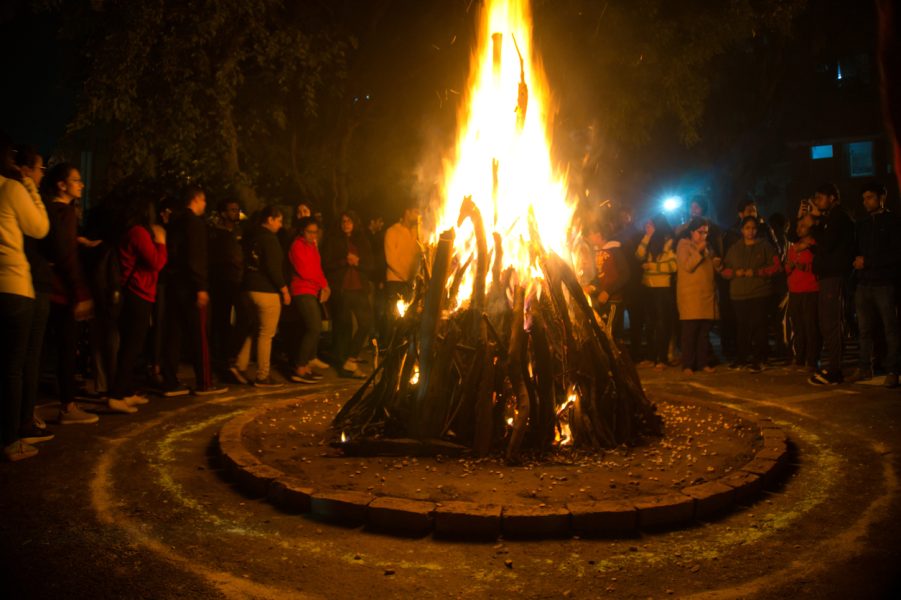
Makar Sankranti: How Indian states celebrate it with a regional twist

Be it Lohri in Punjab, Sankrat in Rajasthan, Bihu in Assam or Pongal in Tamil Nadu, Indian states despite their vast geographical and cultural differences unitedly celebrate the harvest festival of Makar Sankranti every year – the time when winter prepares to bid adieu to herald the onset of spring.
Falling on the 14th or the 15th of January (of the Gregorian calendar) every year, the festival is celebrated when the Sun enters the Capricorn or the Makara phase, hence the name Makar Sankranti. The day is dedicated to the worship of the Sun God and an air of festivity fills every nook and cranny of Indian cities where it is celebrated. Colourful kites dot the skies, annual fairs are organised, traditional puddings and ‘khichdis’ are cooked in households and devotees form a beeline at shrines and prominent ghats to pay obeisance to the Sun God and take holy dips in rivers.
Here is how Indian states celebrate the festival with a regional twist.
Lohri (Punjab)
Lohri is celebrated in Punjab a day before Maghi, the regional name of Makar Sankranti in Punjab, Haryana, Jammu and Himachal Pradesh. The day is an official holiday in Punjab.
In many parts of the state, children go door to door in the day singing songs and are treated to sweets and savories by hosts. Children come home with spoils like rock sugar, jaggery, peanuts, popcorn and sesame seeds, which is distributed among the group in the evening at celebration time.
In the evening, families and communities celebrate the festival by lighting a huge bonfire. It is a tradition to toss jaggery, sesame seeds and rewdis in the fire and sing and dance around it. People come dressed to the festival in sparkling traditional attires and sing Punjabi folk songs and dance to the beats of Bhangra and Gidda. The burning of food signifies burning of the old year and starting afresh.
Also read: Makar Sankranti 2023: Modi-themed kites selling fast in Gujarat
With Lohri primarily being a festival close to the farmers, the traditional dinner served in Punjabi houses on the occasion is Makke di Roti (rotis made of maize flour) and Sarson da Saag (mustard greens), both being winter produces.
Sankrant (Rajasthan)
Sankrant or Sankranti is a major festival in Rajasthan. People host ‘Sankrant Bhoj’ on the occasion, during which they invite friends and family to a feast on special festive meals.
On the occasion, special Rajasthani delicacies and sweetmeats like gajak, ghevar, pheeni, til-laddoo and puwa are made in households.

On the day, Rajasthani women also observe a ritual in which they give household objects to 13 married women.
Children spend the entire day on rooftops, flying colourful kites, competing against one another and hollering in joy when they manage to snip their opponent’s kite. Jaipur hosts a three-day international kite festival every year starting January 14 to give wings to kite-flying enthusiasts.
Makara Sankranti (Odisha)
Odias celebrate the festival by making an offering of Makara Chaula (a pudding-like mix of rice, banana, milk, curd, jaggery, and cottage cheese) to the gods.
Many people across the state start the day by taking a holy dip in ponds and rivers and paying obeisance to the gods. Special rituals are carried out in the Jagannath Temple in Puri on the occasion, while Makara Mela (fairs) are organised in prominent pilgrimage sites like Cuttack’s Dhabaleswar, Hatakeshwar at Atri (Khordha), and the Makara Muni temple in Balasore.
A variety of pithas (sweet rice cakes), ‘muan’ (sweet confectionery made of puffed rice or puffed paddy) and traditional sweets are also offered to deities on the occasion.
Pongal (Tamil Nadu)
The three-day harvest festival celebrated in the southern state of Tamil Nadu is named after the traditional dish by the same name (literally meaning “to boil, overflow”) that is made from freshly-harvested rice, boiled in milk and jaggery.
Just like other parts of the country, houses are cleaned and decorated with banana and mango leaves up while the courtyards and entrances are painted with traditional kolam patterns. People wear festive clothes and feast on the three days of the festival.
On Bhogi Pongal, the first day of the festival, people collect old belongings and burn them in a bonfire, signifying the end of an old life and the beginning of a fresh start.
On the second day of the festival, also called Surya Pongal, dedicated to the Sun God, new rice along with milk and jaggery is cooked in an earthen pot. As part of the rituals, the porridge is cooked until it overflows and at this moment a conch is blown to signify the wish to achieve greater fortunes in the new year. The pot, considered sacrosanct is decorated with flowers, turmeric plant while sugarcane stalks flank it in the open kitchen. The Pongal is then offered to the Sun God.
The Mattu Pongal, or the day of the festival is dedicated to cattle. On this day, cattle are given a ritual bath and their horns are polished before being adorned with flowers and garlands. The Pongal cooked on that day is first offered to the gods, and fed to the cattle after the family enjoys it.
Bihu (Assam)
Also called Magh Bihu, the festival marks the end of the harvest season in Assam and is celebrated by feasting and bonfires.
On the eve of Magh Bihu, also called Uruka, delicacies like pithas and traditional sweets are made for the festival. In the night, a Bhuj or feast is organised where people eat, drink homemade beer and make merry. Usually huts made of bamboo, leaves and thatch called Bhelaghar are made where the feasting takes place in the night.
Also read: Why Gangasagar Mela is teeming with people wanting to tag along the cow’s tail
On the day of the festival, people wake up at the crack of dawn and take a bath to participate in a post-harvest ceremony called Meji in which bonfires are lit in the fields. People circle around these bonfires and pray to their ancestral gods. Offerings of chicken, rice cakes, rice beer, pitha, chira, akhoi, curd and other food are made to the gods during the ritual.
A part of the ritual is to burn the Bhelaghar after which people have a special preparation known as Mah-Karai, a mixture of rice and black gram.


